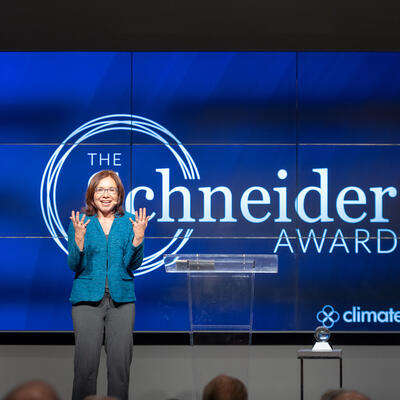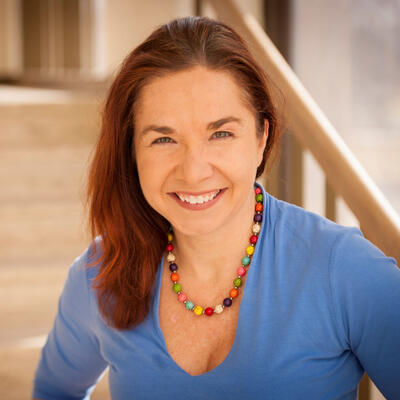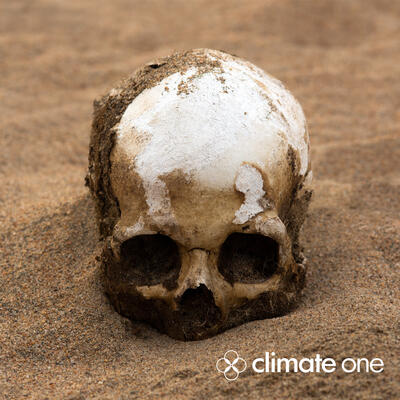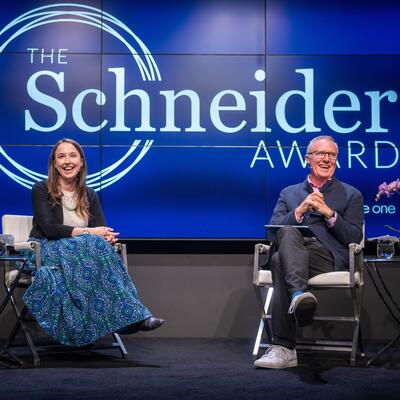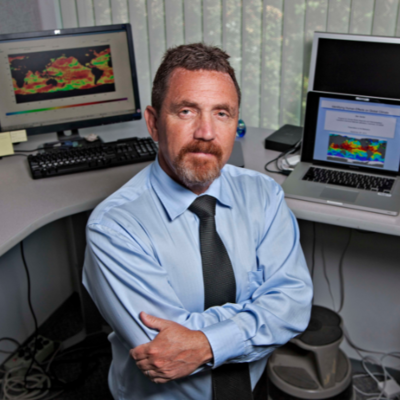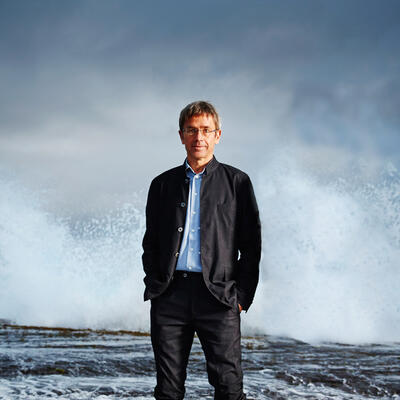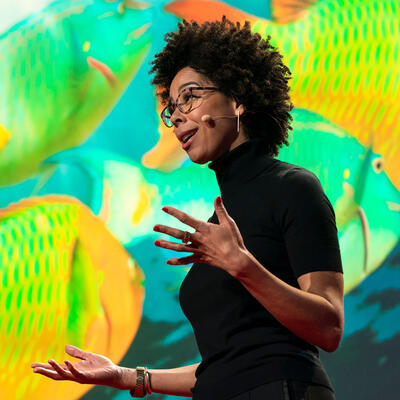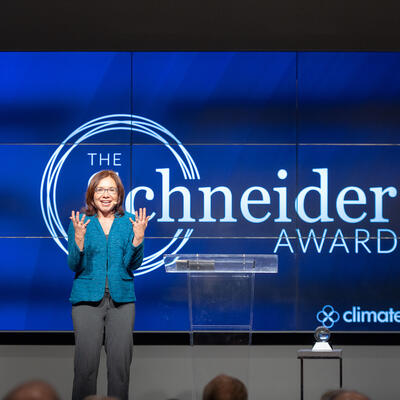
Katharine Hayhoe: Why We Need to Talk About Climate Change
Guests
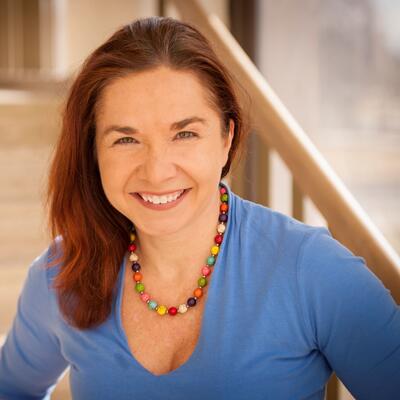
Katharine Hayhoe
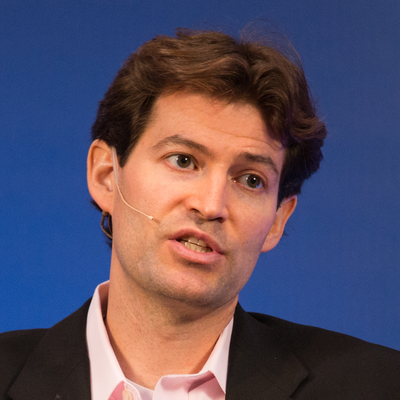
Noah Diffenbaugh
Summary
Many of us find it daunting to talk with our neighbors, colleagues and family members about climate change. But climate scientist Katharine Hayhoe says that having those difficult conversations is the first step towards solving the problem. Hayhoe is known as a “rock star” in the climate world for her ability to talk to just about anyone about global warming. She is joined by Stanford atmospheric scientist Noah Diffenbaugh for a conversation about communicating climate change in transparent, engaging, and accessible ways.
Full Transcript
Announcer: Katharine Hayhoe is director of the Climate Science Center at Texas Tech University. She is also the recipient of this year’s Stephen H. Schneider Award for Outstanding Science Communication, presented by Climate One. Greg Dalton’s other guest today is Noah Diffenbaugh, professor of atmospheric science at Stanford, a senior fellow at the Woods Institute for the Environment and a lead author with the IPCC.
Here’s their conversation.
Greg Dalton: Katharine Hayhoe, I hear a lot about as a host of a talk show that we need more than talk we need climate action. And yet you say that talking about climate is actually meaningful and something people should do more of. So how can talk be so important?
Katharine Hayhoe: Well when you look at the data it turns out that about three quarters of people in the whole U.S. don’t even hear somebody else talk about climate change more than once or twice a year. And if we don’t talk about it why would we care, if we don’t care why would we act. So action begins with the conversation.
Greg Dalton: And then why aren't people talking about it? There’s a term of socially constructed silence; is it like sex and politics we don’t want to talk about it because it’s difficult, why?
Katharine Hayhoe: Well, they’re looking at that because we want to know, right. And some of it is we’re afraid it’s gonna start a fight. Climate change is one of the most politically polarized topics in the entire United States. And I’m not gonna lie, sometimes when I live in Texas and occasionally if I don't want to get into it with anybody when they say, what do you do? I say I work at tech. Most of the time I don’t but sometimes I do, you know, the grocery store that’s not where you really wanna have an argument over the cantaloupes.
But part of it too is because often that conversation might just be depressing and who wants to talk about an apocalyptic scenario where you don't feel like there’s anything you can do about it. And then also often people feel like they don’t know enough to talk about it. I mean it’s this super complicated topic that you use things like large ensembles to study you have to understand words like stochastic and nonlinear and things like that. And so we kind of shy away from it because we feel like it’s just something that those giant eggheads talk about; it’s not something that relates to my life personally. So there’s a lot of barriers I think to having those conversations and we are here to break those barriers down tonight.
[Applause]
Greg Dalton: Let’s also talk about the myths. What are some of the biggest myths about climate change?
Katharine Hayhoe: Well if we read the news which most of us do, whether we like it or not -- if you ever feel that way you don’t wanna see what the news says but you had to look at it anyways. We’re pretty convinced that the biggest myth is that science is somehow matter of opinion or optional but that isn’t the biggest myth when it comes to climate change. The biggest myth that the largest number of people have bought into people who disagree with the science people who agree with the science is the myth that the impacts don't matter to me they’re about future generations or the polar bear or people who live far away, but the solutions do matter to me and I don’t like them. They are gonna disrupt my comfortable life they’re gonna be unpleasant, they may even be punitive, they could ruin the economy, next thing you know the government is gonna be setting my thermostat. So we view the solutions as a greater threat than the impacts whereas in actual fact it’s exactly the opposite. There are many beneficial solutions that can increase the quality of life but the impacts are here today and they’re bad.
Greg Dalton: But people see the cost like I see how much if I'm going to buy cleaner electricity or change my diet or change my car I see the consequences and the cost. The costs are local and personal the benefits sometimes tend to be faraway and more diffuse and in the future. So the cost benefit is problematic.
Katharine Hayhoe: Yes.
Greg Dalton: What can we do about that?
Katharine Hayhoe: That’s why we need everybody not just us scientists because we are really good at diagnosing the problem. We can understand what is happening why it's happening just how bad it is how much worse it’s gonna get in the future but we’re not the ones who can fix this. We need engineers we need urban planners we need people who understand how to manage our lands, how to grow our food, how to suck carbon out of the atmosphere, how to change our attitudes and the way we live. We need everybody on board to fix this thing it’s not just up to us.
Greg Dalton: So today, Katharine Hayhoe is receiving the Stephen Schneider award for climate communication at Climate One. Stephen Schneider is a late Stanford climate scientist who was an early advisor to Climate One. He passed away in 2010 and this award was created in his memory. Stephen Schneider's son Adam is continuing the work in his father's field but from a unique angle. Adam W Schneider is an environmental archaeologist and historian at the University of Colorado. He studies societal responses to climate change throughout ancient history.
Adam Schneider: It’s really important that we understand science is meant to serve humanity. It's not just something that we do in a vacuum for fun. It's got to have a function that's beyond just doing research for its own sake.
One thing that my father strongly believe was that science is as much about morality as it is an intellectual endeavor. He strongly believe that the core of good science can be summed up with the old cliché telling the truth, the whole truth and nothing but the truth. But what I’ll say about Katharine Hayhoe is that I think she takes that ethical principle even further by being willing to tell the truth, not just about the work of Dr. Katharine Hayhoe climate scientist, but also what matters to Katharine Hayhoe the human being. To be willing to talk about Christian values and climate science together at all even with your colleagues is something that would take courage. But in an age where both faith and science have been weaponized by various political and economic interests, to bring the two together in her public outreach efforts about combating climate change whether we’re talking about media interviews town hall meetings or direct contact with nonscientists through the often brutal public arena that’s Twitter and other social media platforms, I think that’s going a step further. And to me it takes a person of rare character to be willing to put not just your work but yourself on the line for something you believe in and Katharine I think is one of those people.
Greg Dalton: That was Stephen Schneider’s son, Adam W. Schneider.
[Applause]
Adam W. Schneider is an environment archaeologist and historian at the University of Colorado.
Noah Diffenbaugh, you came to Stanford just shortly before Steve Schneider died, you are both Stanford professors. Tell us your take on the impact that Stephen Schneider and Katharine Hayhoe as science communicators they impacted the role of scientists as communicators.
Noah Diffenbaugh: Steve was I mean first and foremost he was an incredible scientist and he was also incredibly talented communicator, I think he would've been an incredibly talented communicator whether he’s a scientist or not he was great at communicating. So yeah there’s a long list of metaphors and analogies and quips that Steve pioneered I mean I think the things that we kind of take for granted in the lexicon around climate change. And to me, Katharine, you really been a shining example of carrying that forward. I mean I intersected with your science first and certainly the 2004 paper on climate change in California which is for those of you in the room who weren’t reading the scientific literature in 2004 was really the seminal paper on the future of climate change in California and Katharine led that study with Steve and Chris Field and others. So that to me really there’s someone who is working on climate change in California at the time, you know, had a huge impact. And so I think Katharine has really been a shining light not only in her public communication but really I think with the core of successful communication about climate change is really being grounded in the science really being on the cutting edge in real time, that’s really what provides that foundation for communication.
Greg Dalton: We’re talking about climate change and communication at Climate One with Noah Diffenbaugh professor at Stanford and Katharine Hayhoe director of the Climate Science Center at Texas Tech University. I'm Greg Dalton.
Katharine Hayhoe, climate is often framed as a moral issue. You specializing in reaching, you know, faith communities, evangelicals and tell us about the theological evangelicals and the political evangelicals and how they have different views on climate.
Katharine Hayhoe: Well first of all building off what Noah said. I think that the single greatest description of climate change is the one that the military came up with and that is that climate change is a threat multiplier. So in other words, the only reason we care about a one or two or three degree warming of the temperature of the planet is because it affects all of the issues that we are already struggling with today. So when I speak to people I think the most important thing to do is to connect with whatever the issues are that they already care about; it’s not a case of needing new values it’s a case of saying getting to know people figuring out where they're at and then it is very rare to me a human being who does not already have a key value or part of their identity that does not connect directly to concern over changing climate. Sometimes it takes, you know, a lot of getting to know each other but that connection is there.
And so for myself as a Christian I mean part of the reason why I do what I do is because climate change exacerbate humanitarian issues. And it is just absolutely not fair when you look at the impact it's having on the poorest and most disenfranchised people in the world. I have a slight handicap; I faint at the sight of blood, so a medical career was out of the question I figured climate change is the next best thing, right. So people often say well you know, how do you talk to people at church. Well, I don’t start by like pulling out the IPCC reports and whacking people upside the head with them. Sometimes we feel slightly tempted to do that but that’s not a very effective way to communicate, do you try that in your class maybe?
Noah Diffenbaugh: I don’t touch anyone ever.
[Laughter]
Katharine Hayhoe: True. True.
[Laughter]
Yes. So this method is good for more than one reason. But rather start the conversation with what you have in common. So if we are theological evangelicals, which are people who take the Bible seriously -- evangelical is a very difficult term to define so I actually asked the head of the National Association of Evangelicals a couple years ago what is your definition, and he said people who take the Bible seriously as a good definition.
So if you take the Bible seriously, you know that at the very beginning of the Bible it talks about how humans have been given responsibility over every living thing on this earth which includes our brothers and sisters who are less fortunate than us. Then all through the Bible it talks about God's love and care for creation for nature and then it talks a lot about caring for others who are less fortunate than us, the poor, the widows, the orphans, sharing what we have with people in need. And then right at the end of the Bible there is a zinger that very few people have read and it specifically says God will destroy those who destroy the earth. That's the book of Revelation. So there's a lot that you can talk about but in today's world -- don’t go straight to Revelation okay, it’s at the end for a reason.
In today’s world though the word evangelical is used in a very different way it’s used for political evangelicals. And my definition of a political evangelical is someone who’s statement of faith is written first by their political ideology, only a distant second by the Bible, and if the two come into conflict as they frequently, do they will go with their political ideology over what it says in the Bible. So that's why it's so important to distinguish between the two.
Greg Dalton: And you also talk about this fact, I don’t know post fact world, climate there’s lots of facts flying back and forth and talk about the importance of facts and identity.
Katharine Hayhoe: So when you ask people do you agree with the simple fact that climate is changing, humans are responsible and the impacts are serious. The number one predictor of whether people will agree with those facts -- the scientific facts that we've known that date back to the 1850s -- it’s not how much education people have it’s not how much they know about the science it’s not how smart they are. Actually the smarter we are the better we are at cherry picking information to validate our pre-existing opinions.
Greg Dalton: Lot of deniers are highly intelligent.
Katharine Hayhoe: Yup. The single most important predictor is simply where we fall on the political spectrum. So it has become a matter of identity to say, oh, I don't agree with all that stuff. And that's why again it’s so important to begin our conversations with identity, with a value, with the part of people's identity that they already have that is good that we can honestly at least admire if not actually agree with and share. And then from that position of shared values, walk together connecting the dots to why since we are both the type of person who cares about -- we could both be hunters or birders or hikers. You live in the same place or you care about your kids or, you know, you served in the Armed Forces or you go to a similar type of church. There’s a million points of connection that you could have, the point is making that shared connection first and then walking together to connect the dots to why both of you, because you are that same type of person who shares that same interest or value, would naturally care about the changing climate.
Greg Dalton: Katharine, I wanna ask you about evangelical colleges. There’s some research going on involving your dad and how people can be persuaded to change their views on climate. Tell us about that research.
Katharine Hayhoe: So I was invited a couple of years ago to come speak to a small college in upstate New York called Houghton College which is two hours away from anywhere down a dirt road. They said, we’d like you to come not just to speak but we actually want to start running some experiments. And I said, oh tell me more. They said, we wanna test to see if your talk actually make a difference. I said yes, I wanna know that too because if they don't, I quit.
[Laughter]
I really do want to know. And then so we started to talk about and they said what I would also like to know is whether it matters if I’m there in person or if it’s a video, right. So we organized the whole thing and the day before I recorded my presentation as exact word to word as I possibly could. And then as the students arrived they were first of all, given a short version of the six Americas of global warming questionnaire to kind of see where they stood on climate science impacts and solutions. Then they were funneled into one of two rooms where they either got fake me or live me. And then they -- no, flat me and 3D me, let’s just call it that.
And then they were tested afterwards to see if they change their opinion about anything. And the results were incredibly positive it turns out that there were statistically significant differences on almost any question and it didn't matter if it was flat me or 3D. So out of that that’s where I started our Global Weirding series on PBS which you can find on YouTube because I figured hey a lot more people are gonna watch that than me, you know, going around to all these different places.
So then they wanted to try to analyze the statistics and they said, well can you help us so I’m the subject so I sort of feel a little conflicted after analyzing the data it’s like asking the lab rat to do the analysis for you. But I said fortunately my father is actually a science educator and that's what he did for his PhD and that’s what he does for his research so I passed them along to him. And then they started to expand the scope where they took these videos and they showed them to three different Christian colleges. One where the student population was very conservative in the heart of Texas one with they are kind of the middle-of-the-road upstate New York again different students and one over the border in Ontario where climate change really isn’t a political issue. But all three were theologically kind of at the same level. So politically and their perspectives on climate change they started from very different places: Texas, upstate New York, Ontario all watched the same video the only difference was there was info specifically about their geographic location and then they were tested at the end and you know what happened, every single group moved up to the same level. So you know what that said to me it said to me there’s a reason I’m in Texas.
[Laughter]
Announcer: You’re listening to a conversation with climate communicator Katharine Hayhoe. Coming up, using Twitter to spread the word.
Katharine Hayhoe: One of my favorite tweets comes from a fellow Canadian who says, “you dragged my sorry denier’s ass to the truth.”
Announcer: That’s up next, when Climate One continues.
Announcer: We continue now with Climate One. Greg Dalton is talking with scientists Katharine Hayhoe and Noah Diffenbaugh about finding ways to engage people in the climate conversation.
Let’s get back to their discussion.
Greg Dalton: Katharine, you have about 100,000 followers on Twitter very active and yet you also mute people. So tell us how you decide to mute people how far you’ll go to engage people and then when you decide to.
Katharine Hayhoe: Sure. Well, I’m gonna be more specific, I block people. And the reason I block them is because if you mute someone they could still follow your thread and comment on them and you can't see it whereas if you block and they can't follow your thread and comment on them. And as Noah pointed out in social media the negative voices are the loudest voices they come from a very small part of the population, 10% of the population is dismissive and of that 10% the vast majority of them lurk on the comment sections and on social media waiting to suck your time and energy like a black hole.
So what I do is my rule is I block -- I don’t block for people's opinions on science, you know it's a free world. I block if they are demonstrating an inability to converse in a civil and constructive manner.
[Applause]
Greg Dalton: Have you ever met some of these people face-to-face and if you ever persuaded or changed someone's mind?
Katharine Hayhoe: I know that I have changed people's minds because we've been doing these experiments where we actually have data which is awesome.
Greg Dalton: But how about meeting people face-to-face?
Katharine Hayhoe: My personal definition of a dismissive -- you can tell like definitions. My definition of dismissive is somebody who if an angel from God appeared in front of them with tablets of stone saying global warming is real and letters aflame they still would not change their minds. So why would I think I can change their minds. My focus is not on the 10% who are dismissive my focus is on the people who are disengaged or doubtful the people who are cautious they’re not quite sure. They often lead with their doubts so we mistake them for dismissive but they're leading with their doubts because they want answers to what they've heard on their favorite media station or, you know, a politician or a leader who they trust. And so with these people we absolutely can change minds and one of my favorite tweets, once in a while I save the really good tweets for when I’m having a bad day. One of my favorite tweets comes from a fellow Canadian who says, you dragged my sorry deniers ass to the truth.
[Laughter]
Greg Dalton: We’re talking about climate and communication at Climate One at the Commonwealth Club. I'm Greg Dalton with Katharine Hayhoe, director of the Climate Science Center at Texas Tech University. Noah Diffenbaugh, professor of Atmospheric Science at Stanford University.
We’re gonna go to our lightning round. True or false for Katharine Hayhoe. You sometimes get depressed about the hard truth of the climate math?
Katharine Hayhoe: I wouldn't be a scientist if I didn't.
Greg Dalton: True or false, Noah Diffenbaugh. Stanford's Earth Sciences Department floats on oil money?
Noah Diffenbaugh: I would say there's a lot of really cutting edge research about the way the climate system works it's been funded through an endowment that came from oil money.
Greg Dalton: Katharine Hayhoe, as a Christian you can summon love for the Koch brothers and other climate deniers?
[Laughter]
Katharine Hayhoe: As the saying goes, I love you but I don't like you. No. So in all seriousness though, I don't really feel it’s the matter of me somehow trying to drum up the love because I am never gonna be able to do that on my own. The feeling that I have is that the love has to come from God because it's not something that I physically personally or emotionally am capable of.
Greg Dalton: True or false, Noah Diffenbaugh. It’s easier for you to speak from your head than your heart?
Noah Diffenbaugh: True at Climate One.
[Laughter]
Greg Dalton: Katharine Hayhoe, speaking from the heart is an unnatural act for many scientists, especially the men?
Katharine Hayhoe: I’m gonna be honest with you the first time when I finally realized that to connect with people I had to share with them why I cared, not just all this data and facts and charts but actually what was in my heart. It was as scary as pulling down my pants on stage. It scared me to talk about what like emotions and feelings related to climate change. We’re not trained to do that in fact we’re trained not to do that. So I’m gonna go with --
Greg Dalton: Gender thing. Okay.
Katharine Hayhoe: -- the gender explanation.
Greg Dalton: Noah Diffenbaugh, true or false. Fossil fuels have improved the human condition?
Noah Diffenbaugh: True.
Greg Dalton: Association. I’m just gonna mention a person, place or thing and you tell me the first thing that pops into your mind unfiltered. Katharine Hayhoe. What comes to your mind when I say Carl Sagan?
Katharine Hayhoe: Telescope.
Greg Dalton: Noah Diffenbaugh. President Trump's White House science advisor?
Noah Diffenbaugh: Who is it?
[Laughter]
Katharine Hayhoe: Kelvin Droegemeier.
Greg Dalton: He didn’t have one for two years. Kelvin, great name for a scientist, right. Kelvin Droegemeier was confirmed by the Senate on January 3rd 2019.
Alright let’s end it there let’s thank them for getting through the lightning round.
[Applause]
We’re talking about climate science and communication at Climate One. I'm Greg Dalton with Katharine Hayhoe and Noah Diffenbaugh.
Katharine Hayhoe, a lot of the climate conversation you mentioned earlier that the government is gonna set my thermostat, a lot of the conversation people feel bad because of what they eat or what they drive. So get us to the shame and should part of the climate conversation which I think is a real hangup for a lot of people.
Katharine Hayhoe: Oh yeah. I mean, I have talked to a farmer in West Texas who thinks it’s all natural cycle but he look at me and he’ll say, I know I drive a big truck but I need the truck. So even still, we have the sense of we’re using these resources. I was at a meeting once with other faith leaders and I'll never forget one of the people in the room turned to everybody else and he said, you know, every time you turn on a car you're sinning. And you know how that made me feel? I wanted to go find the biggest Hummer I could and just turn it on and just drive circles around them. Because I was like okay, so I got here to this meeting you’re saying that was a sin. I live in a place where there’s no public transport so going to work is a sin. My child is sick, I take him to the hospital that’s a sin. Thank you very much. It was the most frustrating and infuriating reaction and that made me realize wow that's what we all feel when we’re told you can’t do this you shouldn’t do this, you’re a bad person for that.
And so I really appreciate that you asked the question and we even have a Global Weirding video specifically about this the question about fossil fuels. And I would just like to say I am grateful for fossil fuels. I would not be here today if it were not for fossil fuels. Fossil fuels freed women from unspeakable drudgery, fossil fuels actually helped end slavery in this country and fossil fuels brought us all the benefits of modern life that we enjoy today. But just like a child that grows beyond formula in the same way we too are already growing and must grow even faster beyond fossil fuels and we can do so because of the benefits that they brought us.
[Applause]
Greg Dalton: Katharine another part of the climate conversation is voluntary virtuous restraint. Less meat, less air travel, a little more of this, is that gonna get us there, is that necessary and sufficient or is that kind of are we deluding ourselves if we think that going vegan is gonna create the kind of change on the scale is required?
Katharine Hayhoe: No, it won’t. And a very distant second after people who don't accept the climate, science of climate change very distant second the most amount of attacks I get on social media are from vegans who think that it will solve the climate crisis and they don’t like it when I say I actually crunched the numbers on methane emissions and it won’t. Does that mean it’s pointless? No, it doesn’t mean it’s pointless. In fact individually, depending on our lifestyles for many of us the most important thing we can do is eat lower down the food chain, reduce food waste, look at plant-based diet.
But individual choices are not gonna fix this thing depending on how you crunch the numbers individual choices are only gonna take a 30% maybe max 40% of the way there. The bottom line is we have to completely change the way our entire society gets its energy from fossil fuels. And that means that every option has to be on the table. It is not I will do only this and this will fix the world. There is no I will do only this. And so that's why one of my personal favorite encouraging resources is Project Drawdown. You guys heard of Project Drawdown, okay.
[Applause]
There’s the book right there. So what they did was they went through they said correctly there’s no silver bullet but there’s lot of silver buckshot. And they went through and they listed a hundred different solutions and some of these solutions are very surprising. Reducing food waste is near the top because we throw a third of our food away. Well you know that’s something that’s pretty simple that I can do personally in my life but I can also advocate for it in the community. Education of women and girls of course is one of my absolute favorites on the list. There’s a lot of smart soil management, putting carbon back in the soil, smart agricultural practices.
And so getting back to your original question. In our community we fly a lot for most of us the biggest part of our carbon footprint is flying and so there’s, you know, flying less, don’t fly. I said, you know what, I’m not about less I’m about smart. Let’s eat smart, let’s live smart let's travel smart let’s get our energy in smart ways. Let’s do this in a way that’s better. It’s not about returning ourselves voluntarily to medieval times I'm not a big fan of medieval reenactments. I was wondering what would happen if you go back and they break your glasses. Have you thought about that, you’re blind as a bat? It’s not about going back to medieval times, it's about moving forward into the future and to do so we have to do everything smarter. Not because we have to, but because we want to; because it really is better for us, it’s better for our health it’s better for our pocketbook it’s better for the world too.
[Applause]
Greg Dalton: Noah Diffenbaugh there’s been alarming news recently about Arctic tipping points in the Arctic and Greenland explain to us what that means. I remember Stephen Schneider at Climate One in 2010 he actually introduced his final book at Climate One. He said there’s tipping points out there but we won't know where they are until we’re 50 years past them, which chills me to this day. But tell us about recently about Arctic tipping points and what it might mean for sea level rise.
Noah Diffenbaugh: Yes so global sea level rises very clear it's happening and we’re already experiencing increased risks from storm surge flooding. For example, the flooding during Superstorm Sandy was about twice as likely with the sea level rise that’s happened than if there had not been sea level rise. So just elevating the floor on which that storm surge is occurring has already increased the risk of flooding during landfalling storms. So we’re already living with the impacts of sea level rise not to mention the sunny day flooding and managed retreat that's already happening. And most of what we’ve experiences so far has been thermal expansion from the ocean water getting warmer and now we’re entering into a regime where the loss of land ice is really contributing to further sea level rise.
So there's a lot of potential sea level rise that's locked on land or has been locked on land in the form of these large ice sheets in Greenland and Antarctica. And I think what's been consistently clearer certainly over the last decade is that as we in the scientific community -- and I do not study ice sheets so that’s the totally royal we. As the people who are studying ice sheets continue to study them and learn more that increase understanding continues to push the likelihood of rapid loss of land ice higher probabilities are getting higher the more that we understand about those processes. And we’re certainly conducting a global experiment for which we don't have any previous example to look back on. We can look at paleoclimate periods where earth has been warmer; there's been less ice on land or in some cases, no ice on land sea levels was much higher during those periods. The rate of change in terms of the forcing, in terms of the increase in greenhouse gas concentrations was much slower than what we’re conducting now. So we're observing a once-in-a-lifetime experiment once in a geologic lifetime experiment we’re observing in real time and certainly in terms of, you know, whether or not the Commonwealth Club of California will continue to have its front door above sea level here in this beautiful new location that remains to be seen.
Announcer: You're listening to a Climate One conversation with atmospheric scientist Noah Diffenbaugh and climate scientist Katharine Hayhoe. Coming up, why fear won’t fix the problem.
Katharine Hayoe: What we need is rational hope. Rational in that we understand the magnitude of the problem that we have but hope in that we are motivated by the vision of a better future. And if you ask me what’s the biggest thing we’re missing right now I would say we’re missing a vision of a better future.
Announcer: That’s up next, when Climate One continues.
Announcer: You’re listening to Climate One. Greg Dalton is talking with Katharine Hayhoe, winner of this year’s Stephen H. Schneider Award for Outstanding Science Communication, and Noah Diffenbaugh, Senior Fellow at the Woods Institute for the Environment at Stanford University.
Here’s Greg.
Greg Dalton: Let’s go to our audience questions. Welcome to Climate One.
Male Participant: I’m Felix Kramer. Hi. Could we go back to that last question which was about Arctic ice? And I'm wondering if we can talk about what happens if in the next 10 years we have black water instead of sea ice not reflecting the sun and how do you think the relative importance of that to other challenges right now and I’d love to hear from Katharine as well on that. Thank you.
Greg Dalton: So the idea that there's less ice bouncing heat back into the atmosphere. Noah Diffenbaugh.
Noah Diffenbaugh: Yeah, so I think I guess I would challenge a lot of, I’m noticing a lot of distinguished colleagues in the room, fantastic scientist in the room I would challenge anyone in the room or watching on public television or listening on the radio or on the podcast or following along on Twitter to come up with a change in the earth system over the last three decades that is more rapid and more steep than the loss of Arctic sea ice. I have not seen it; the signal-to-noise ratio is phenomenal and we’re now on a regime in the Arctic where the highest largest extent of sea ice is well below what the lowest extent was 30 years ago. So it's been phenomenal statistically it’s been phenomenal environmentally it’s been phenomenal for geopolitics, right. I mean we’re seeing whether it’s mineral resources or territory, you know, it is wide open right now.
So in terms of the global energy balance there’s certainly a loss of reflective ice. One of the interesting areas of research right now is what the effect on the atmospheric circulation is from that rapid loss of sea ice and in particular here in California and other parts of the middle latitudes what impact that has. Ben Santer is here and has done really nice work recently showing that that loss of Arctic sea ice promotes high atmospheric pressure in the northeast pacific that blocks the storms from reaching California.
Greg Dalton: So Katharine Hayhoe I hear the cooler at the top of the world is in trouble. And when I hear things Noah Diffenbaugh say this is faster than anything else we've seen, I get a lump in my stomach.
Katharine Hayhoe: The science is not what gives us hope.
Noah Diffenbaugh: It’s the scientists.
Katharine Hayhoe: Yeah exactly, yes. So as some of you may know I am an atmospheric scientist, but I am a professor in the political science department. You may ask why the answer is because climate change is the most political science in Texas. But because of that I get to work with all kinds of great colleagues who know a lot of things that I don't know. And so last year I wrote a paper with a colleague who’s an expert in energy resource and sub governmental theory. Now I didn’t even know there was such thing as sub governmental theory until we started working together and it was fascinating. So we wrote this paper that was published in Environmental Research Letters last year and it’s open source you can read it if you want where he argued very compellingly that the most dangerous feedback in the climate system is in the Arctic but it’s not the sea ice it’s the exposure to the massive fossil fuel resources that will come when that sea ice melts because extraction of those resources would mean the absolute and utter failure of the Paris agreement. So the Arctic seems far removed but the Arctic really is the key to our future.
Greg Dalton: Let’s go to our next question. Welcome to Climate One.
Female Participant: Hi, I’m Min Koffman and Katharine Hayhoe what gave you the courage to go speak to other people about climate change?
Greg Dalton: Min, how old are you?
Female Participant: I’m 11.
Greg Dalton: Thanks for being here.
[Applause]
Katharine Hayhoe: So my very favorite Global Weirding episode on YouTube is called I'm just one kid what can I do. And when we were researching that we started to look into all the stuff that kids are doing and you guys are amazing. It’s just incredible to hear about all the cool things that kids are doing, very brave things. I mean kids are suing the federal government. Imagine how nerve-wracking that is. Kids are inventing new technology they’re growing algae under their beds and turning it into biofuel which is just incredible.
Greg Dalton: So that’s what under their beds.
[Laughter]
Katharine Hayhoe: A few socks, the algae and the biofuel.
Greg Dalton: Looks like mold to me.
Katharine Hayhoe: Yeah. But what gave me the courage, I’m glad you asked that because it’s tough to stand up and talk about the stuff. What gave me the courage was recognizing that the people who are suffering the greatest impacts don’t have a voice. And so if I have a voice I wanna use it on their behalf.
[Applause]
Male Participant: Hi, my name is Wayne. Katharine, we’re in a climate emergency we have maybe a decade or two to get off fossil fuels or we’re gonna blow past climate tipping points. How do you talk about climate to your evangelicals as if it's a real emergency, as if a kid is grabbing for a bottle of poison and about to drink it, you wouldn't say well we should think about whether that's a good thing to do or not. How do you talk about this as an emergency, a climate emergency?
Katharine Hayhoe: Thank you. Well first of all I talk to a lot of people. It's not, you know, I talked to water managers and farmers and ranchers and the women's club and the book club and the Kiwanis club. And what I’ve found is that when we go in saying it’s the end of the world as we know it, people tune right out. Because if it’s the end of the world, if we have to change everything we know about within a fixed deadline, why even bother.
So we did a Global Weirding episode on messaging with fear versus hope. And on one side, you know, we’re scientists we’re not gonna sugarcoat it. We’re not gonna like pretend that things aren't bad; they are bad. Sea level is rising twice as fast now as it was 25 years ago. We’re seeing these studies coming out that each study almost it seems like is worse than the one before. But at the same time fear is not going to motivate the long-term sustained action we need to fix this thing. Fear is an emotion that helps us run faster than the bear, or as we learn in Canada run faster than the person beside you.
[Laughter]
Bear is only gonna get one person. That’s not what we need to fix this. We don't need an apocalyptic vision of the future that’s just gonna make us when a climate event pull the covers over our heads. I had a colleague share with me and this is in Texas that she couldn't even bring up the words climate change in her class because people would have panic attacks in her class. That is not gonna help us fix this problem. What we need is rational hope. Rational in that we understand the magnitude of the problem that we have but hope in that we are motivated by the vision of a better future. And if you ask me what’s the biggest thing we’re missing right now I would say we’re missing a vision of a better future.
Greg Dalton: I recently interviewed some psychologists up here who agree with you on fear, but they say that just pushing it aside and pretending it's not there and having kind of fake hope or contrived hope is not authentic hope. So you gotta hold that fear and then kind of work through it and then you get to the real hope that really fuels you forward. But just kind of bearing that fear doesn’t, faking it doesn’t work. Let’s go to our next question.
Male Participant: Hi. Andy Ganter, I’m an environmental scientist here in the Bay Area. Hi Katharine, I could not think of anyone more deserving of this award than you. Congratulations. I want to ask you we've all been at this for a long time, climate education. You have the cred to speak in places that you describe that would never want to hear from me. And I'm wondering whether you can talk about kind of change that you have seen in the more conservative audiences that you’ve talked to say over the last 10 years. And if there is change what does it look like that you’ve noticed?
Katharine Hayhoe: Yeah, I’ve been in Texas now for over 10 years and I absolutely have witnessed the change. The change is that people and organizations who would not give me the time of day 10 years ago who would as I say, you know, cross the other side of the street to avoid me. Those people are now so concerned over the changes that they are seeing happening in the places where they live and the way that it is affecting their livelihood and their local environment that they are calling me and asking me to come speak to groups which 10 years ago the door would not just have been shut it would've been triple locked with a big keep out you climate scientist on the door. So I've been to talk to ag groups so, you know, if you think and evangelical college is conservative you have not met an ag group in Texas. Ag groups are calling me now, or the oil and gas industry is calling. People who own large amounts of land want to know should we be selling what are we supposed to be doing with this.
So there is significant movement and when people come to ask you that’s when the door is open that’s when the time has come to figure out what you have in common what are the values you can start with and where can you go together. Because knocking on the door rarely yields positive constructive outcomes but when that door is cracked open and you’re cautiously invited in by one person and then everybody else in the room is giving Joe the evil eye because why did Joe invite this climate scientist but you’re in the room, that’s when positive things can happen and they absolutely are happening in Texas. And if they can happen in the west part of Texas they can pretty much happen anywhere in the country.
Greg Dalton: Let’s go to our next question.
Male Participant: How do we shift this conversation to even if we stop today we would be beyond potentially okay. So how can we switch the conversation where people still need to cut but yes we need to actually geo-engineer we need carbon sequestration carbon removal whatever you want to call it. Why is that not the clarion call let’s get the carbon out of there let’s put it out of the environment maybe in a rock or somewhere else. Why isn’t that the number one thing we’re talking about we don’t have to be sinning to drive your SUV you can be offsetting that or putting rock or putting other sequestration methods offsets etc. Why isn’t that the number one thing we talk about when it becomes less political because it's another bill we pay is our offset for the month.
Noah Diffenbaugh: Katharine is looking at me.
Katharine Hayhoe: Well first of all I would say people are absolutely starting to talk about it. And I think we need to be talking about it but it’s not like an indulgence where you pay for your sins. We have to do both. We don't have the luxury anymore of saying we can produce as much carbon as we want and just suck it back out. But I am personally very excited by the work of organizations like the Swiss Climeworks is working with David Keith where they’ve actually sucked carbon out in the atmosphere and they’ve turned it into fuel. How amazing is that? Or they’ve turned it like you said into a rock or again, there is a lot of regenerative agriculture techniques where you can put carbon into the soil where it’s actually good for the soil and we want it in the soil.
So the answer is yes, but the answer is also yes to cutting carbon as soon as possible. The answer is we need pretty much everything on the table and with geo-engineering specifically often people use it only to refer to solar radiation management as opposed to all different types of geo-engineering. Part of the challenge we’ve run into the scientific community is nobody wants to even pay for studies to figure out does it work, what are the side effects. So the thing I'm most afraid of is that some country that has the technical ability could do something really invasive to stave off climate change. It’d be like giving an experimental drug to the entire planet at the same time without knowing really what all the side effects are because people are too afraid to fund the scientist to actually just research and study this so we understand. What do you think?
Noah Diffenbaugh: Yes, I think I mean I’ve heard a lot of strong statements before the question mark of the questions. And I think a lot of the statements are stronger than the evidence really both in terms of the implications of different levels of global warming and the potential side effects of geo-engineering. I think there are certainly thresholds on the climate system and, you know, as Greg was saying earlier and Steve Schneider used to say we’re not really gonna know where those tipping points are until we’ve already passed them and I think science bears that out. And lot of my work over the last few years has been on trying to understand the impacts of between 1.5° and 2° or 2° and the national commitments that put us more at 2.7, right. And there's a lot of interesting nuance there.
And, you know, I think we have to keep in mind that fossil fuels have really driven the lifestyle that we all that's gotten us into this room now and there are billions of people on planet Earth that don't have access to that. And that again whether you take an ethical view or practical view of that there’s a lot of momentum towards further energy use and I think and we don’t have an alternative right now that could supply the global -- the whole world, the whole global population with the energy that’s necessary for human well-being. And so to me the real challenge is how do we ensure that the world has access to the energy resources that are necessary for high-quality human life never mind getting out of abject poverty and how do we do that in a way that minimizes the impacts on the climate system.
Greg Dalton: Also mentioned we have an entire podcast on geo-engineering going carbon negative. We did a whole thing on carbon sequestration putting it in. You can look at our podcast for that. Let’s go to our next question. Welcome.
Male Participant: Katharine Hayhoe, what kind of political argument or scientific will it take to persuade the leaders of powerful nations to accept climate change and global warming?
Katharine Hayhoe: Great question. Well, unfortunately most of them have accepted it except for the U.S. and some in Australia and Brazil. So it's actually, you know, it’s kind of spreading. Unfortunately I think the political argument is people have to say I’m not gonna vote for you. That’s where it starts and we have a huge barrier to overcome and this relates to somebody else's question earlier. But I did something a couple years ago that had a profound impact to me. It took two seconds. I went to Wikipedia I looked at the list of the richest companies in the world on Wikipedia, ever done that? And then I looked at how many of those companies got their wealth either entirely or mostly from either extracting, selling or using fossil fuels. At the top of the list was Walmart and Walmart is going to be 50% clean energy by 2025. Number 11 was Apple and Apple is already 100% clean energy and they’re decarbonizing the supply chain. But in between it was all fossil fuels.
So the challenge we have is not just the government the challenge we have is that the money and the power in this world rests in the hands of corporations who have every vested interest in maintaining our addiction to it as long as possible, because every year that goes by they’ll make more money. And that's why it's so important for kids to grow up to raise their voices to vote to tell people I am not gonna vote for you if you say this. Thank you.
Announcer: That’s Katharine Hayhoe, director of the Climate Science Center at Texas Tech University and the recipient of the 2018 Stephen H. Schneider Award for Outstanding Science Communication. Greg Dalton’s other guest today was Noah Diffenbaugh, Professor in Earth System Science and Senior Fellow at the Woods Institute for the Environment at Stanford University.
To hear all our Climate One conversations, subscribe to our podcast at our website: climateone.org, where you’ll also find photos, video clips and more.
Greg Dalton: Climate One is a special project of The Commonwealth Club of California.
Kelli Pennington and Sara-Katherine Coxon run our audience engagement.
Tyler Reed is our producer.
The audio engineers are Mark Kirchner and Justin Norton.
Anny Celsi and Devon Strolovitch edit the show.
I’m Greg Dalton the executive producer and host.
The Commonwealth Club CEO is Dr. Gloria Duffy.
Climate One is produced in association with KQED Public Radio.
Climate One is presented in association with KQED Public Radio.
